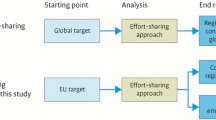Abstract
The overall targets for greenhouse gas emissions of the Kyoto Protocol are not based on a specific objective for the future world climate. Moreover, the allocations of emissions restrictions among countries do not have a principled logic and impose arbitrary differences in costs. Calculations arepresented of the costs of alternative guidelines for emissions restrictions, each of which has a plausible ethical basis: equal per capita reductions, equal country shares in reductions, equalized welfare costs, and emulation of the United Nations budget allocations. All of these would result in far lower total costs of reaching the Kyoto targets. The alternatives would also eliminate the wholly capricious accommodations given to the Former Soviet Union and Eastern Europe. The lower cost alternativeswould permit the Annex B countries to make unequivocal commitments for cost reimbursement to the non-Annex B countries to induce them to participate in emissions reductions. Everyone would gain from that.
Similar content being viewed by others
References
Babiker, M. H., Reilly, J., Mayer, I., Eckaus, R. S., and Wing, I. S.: 2001, ‘The MIT Emissions Prediction and Policy Analysis (EPPA) Model’ Joint Program on the Science and Policy of Climate Change, MIT.
Babiker, M. H., Reilly, J., and Jacoby, H.: 1999, ‘Developing Country Effects of Kyoto Type Emissions Restrictions’ Energy Pol. 28, 525–536.
Eckaus, R. S.: 1994, ‘Laissez Faire, Collective Control or Nationalization of the Global Commons’ in Carraro, C. (ed.), Trade, Innovation, and Environment, Kluwer Academic Publishers, Dordrecht, pp. 283–300.
Frankel, J.: http://www.brookings.edu/dybdocroot/comm/PolicyBriefs/pb052/pb52.htm.
Hinchey, M. and Fisher, B. S.: 1997, ‘Negotiating Greenhouse Abatement and the Theory of Public Goods’ Nota di Lavoro, 58.97, Fondazione Eni Enrico Mattei, Sept., p. 18.
Nordhaus, W. and Boyer, J.: 1999, ‘Requiem for Kyoto: An Economic Analysis’ Weyant, J. P. (ed.), Energy J., Special Issue, ‘The Costs of the Kyoto Protocol: A Multi-Model Analysi’.
Poterba, J. M.: 1993, ‘Global Warming Policy: A Public Finance Perspective’ J. Econ. Perspect. 7, 47–64.
Rangel, A.: 2002, ‘Forward and Backward Intergenerational Goods: Why is Social Security Good for the Environment?’ forthcoming in the American Economic Review.
Reilly, J.: 1995, ‘Climate Change and Global Agriculture’ Amer. J. Agric. Econ. 77, 727–733.
Weyant, J. P. (ed.): 1999, ‘The Costs of the Kyoto Protocol: A Multi-Model Evaluation’ Energy Journal, special issue.
Author information
Authors and Affiliations
Rights and permissions
About this article
Cite this article
Babiker, M.H., Eckaus, R.S. Rethinking the Kyoto Emissions Targets. Climatic Change 54, 399–414 (2002). https://doi.org/10.1023/A:1016139500611
Issue Date:
DOI: https://doi.org/10.1023/A:1016139500611





